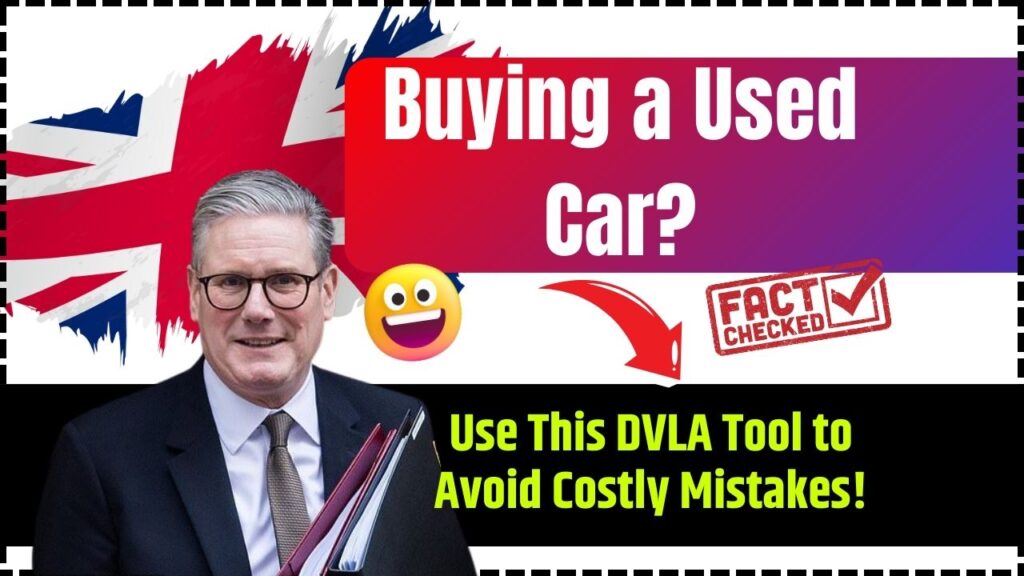
Buying a Used Car? Use This DVLA Tool to Avoid Costly Mistakes: Purchasing a used car can be an exciting yet daunting experience. While it offers the advantage of cost savings, it also comes with potential risks, such as hidden histories or undisclosed issues. To safeguard yourself from these pitfalls, the Driver and Vehicle Licensing Agency (DVLA) provides a valuable resource. By utilizing the DVLA’s Vehicle Information Service, you can access crucial details about a vehicle’s history, ensuring you make an informed decision and avoid costly mistakes. This comprehensive guide explains how to use the DVLA Tool for Buying a Used Car effectively, including step-by-step instructions, additional checks to perform, practical buying tips, and frequently asked questions to help you make a safe and informed purchase.
Buying a Used Car? Use This DVLA Tool to Avoid Costly Mistakes!
Purchasing a used car requires diligence and informed decision-making. By leveraging the DVLA’s Vehicle Information Service and conducting supplementary checks, you can uncover vital information about a vehicle’s history and condition. This proactive approach not only safeguards your investment but also ensures peace of mind on the road.
| Aspect | Details |
|---|---|
| DVLA Tool | Vehicle Information Service |
| Information Provided | Vehicle tax status, MOT expiry date, date of first registration, year of manufacture, engine size, CO2 emissions, and more. |
| Required Details | Vehicle’s registration number (number plate). |
| Additional Resources | MOT History Check, Vehicle Recall Information |
| Official Guidance | GOV.UK – Checks When Buying a Used Car |
Understanding the DVLA’s Vehicle Information Service
The DVLA’s Vehicle Information Service is an online platform that allows potential buyers to verify essential details about a used vehicle. By entering the vehicle’s registration number, you can access information such as:
- Vehicle Tax Status: Confirms whether the vehicle is currently taxed.
- MOT Expiry Date: Indicates when the vehicle’s MOT is due.
- Date of First Registration: Shows when the vehicle was first registered.
- Year of Manufacture: Provides the year the vehicle was built.
- Engine Size: Details the engine’s capacity.
- CO2 Emissions: Offers information on the vehicle’s environmental impact.
Accessing this information is crucial to ensure the vehicle meets your expectations and is legally compliant.
Why Use the DVLA Tool?
- Prevent Fraud: Verify the vehicle’s history and legitimacy to avoid scams.
- Check Authenticity: Confirm that the seller’s description matches the official records.
- Ensure Legal Compliance: Make sure the vehicle is properly taxed and MOT certified.
How to Use the DVLA Tool to Avoid Costly Mistakes?
Using the service is straightforward:
- Gather the Vehicle’s Registration Number: Obtain the number plate details from the seller.
- Visit the DVLA’s Vehicle Information Service: Navigate to the official website.
- Enter the Registration Number: Input the number plate details into the provided field.
- Review the Vehicle Information: Examine the details to ensure they align with the seller’s description.
This process helps verify the vehicle’s legitimacy and uncovers any discrepancies that may warrant further investigation.
What to Look for in the Results
- MOT History and Advisories: Check for recurring issues or potential problems.
- Vehicle Tax Status: Ensure the vehicle is legally taxed.
- Matching Details: Confirm that the model, color, and engine size match the seller’s description.
Additional Checks to Perform
While the DVLA’s Vehicle Information Service provides foundational information, it’s advisable to conduct further checks for comprehensive assurance:
1. MOT History Check
Reviewing the vehicle’s MOT history can reveal recurring issues or advisories. Access this information through the MOT History Check by entering the vehicle’s registration number.
2. Vehicle Recall Information
Ensure the vehicle hasn’t been subject to any safety recalls. Use the Vehicle Recall Information service to verify.
3. Outstanding Finance Check
Determine if there’s any existing finance on the vehicle, as this could lead to repossession. Services like the AA Vehicle Check offer this information.
4. Insurance Write-Off Status
Check if the vehicle has been previously written off due to damage. The HPI Check provides detailed reports on a vehicle’s history.
Common Mistakes to Avoid
- Not Using the DVLA Tool: Skipping this step increases the risk of buying a stolen or unsafe vehicle.
- Ignoring MOT History: Failing to review the MOT history could lead to unexpected repair costs.
- Overlooking Finance Checks: Buying a vehicle with outstanding finance can result in repossession.
- Trusting the Seller’s Word Alone: Always verify the information independently.
Everything You Need to Know About the UK MOT Test in 2025
New MOT Rules Explained: What Drivers Need to Know
DVLA Vehicle Check—Find Out Hidden Details About Any Car Instantly!
Frequently Asked Questions (FAQs)
- Is the DVLA’s Vehicle Information Service free to use?
- Yes, the service is free and accessible to the public.
- Can I check a vehicle’s MOT history through the DVLA?
- Yes, the DVLA provides an MOT History Check service online.
- What should I do if the vehicle’s information doesn’t match the seller’s description?
- Discuss the discrepancies with the seller. If unresolved, consider walking away from the deal.
- How can I verify if a vehicle has been stolen?
- Services like the HPI Check can provide information on whether a vehicle has been reported stolen.
- Is it necessary to perform all these checks before purchasing a used car?
- While not mandatory, conducting these checks can prevent future issues and ensure a sound investment.







